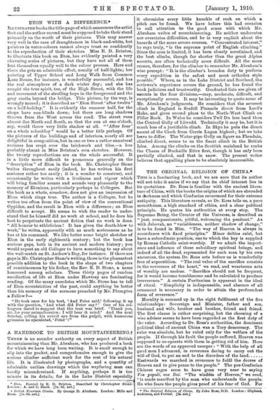A HANDBOOK TO BRITISH MOUNTAINEERING4
THERE is no sounder authority on every aspect of British mountaineering than Mr. Abraham, who has produced a book for which we have long been waiting. It is small enough to slip into the pocket, and comprehensive enough to give the serious climber sufficient work for the rest of his natural life. It is illustrated by photographs, and a quantity of admirable outline drawings which the wayfaring man can hardly misunderstand. If anything, perhaps it is too minute in its details, for in the Lake District especially • Eton. Painted by E. D. Benton. Described by Christopher London : A. and C. Black. [7e. 6d. net.]
British Mountain Climbs. By George D. Abraham. London: Mills and Boon. [7e. 6d. net.]
it chronicles every little knuckle of rook on which a pitch can be found. We have before this had occasion to call attention to the good sense with which Mr. Abraham writes of mountaineering. He neither underrates nor overstates difficulties, and he is very explicit about the hazards of the more severe courses. " Concentrated interest," he says truly, "is the supreme point of English climbing." Since the area is limited, it has been closely scrutinised, and the best climbs, though far shorter than the great Alpine ascents, are often technically more difficult. All the more reason, therefore, for the climber to remember Mr. Abraham's wise precept : " It is the climber's bounden duty to perform every expedition in the safest and most orthodox style possible." Where, as in the Lake District and Scotland, the reviewer's experience covers the ground, he has found the book judicious and trustworthy. Graduated lists are given of ascents in the four divisions,—easy, moderate, difficult, and exceptionally severe. It may be interesting to quote some of Mr. Abraham's judgments. He considers that the severest climb in England is Scafell Pinnacle direct from Lord's Rake, and gives second place to the North-West Climb on Pillar Rock. In Wales he considers Twll Du less hard than the Central Gully of Lliwedd. Technically it may be, but it is much less of a justifiable climb. In Skye he puts the direct ascent of the Cioch from Corrie Lag-an highest ; but we take leave to differ. The Water-pipe Gully on Sgurr na Fheadain, climbed direct, seems to us the finest climb in the British Isles. Among the climbs on the Scottish mainland he ranks the Chasm of Buchaille Etive first, though it has only been partially climbed, and that in snow. The present writer believes that appalling place to be absolutely inaccessible.














































 Previous page
Previous page